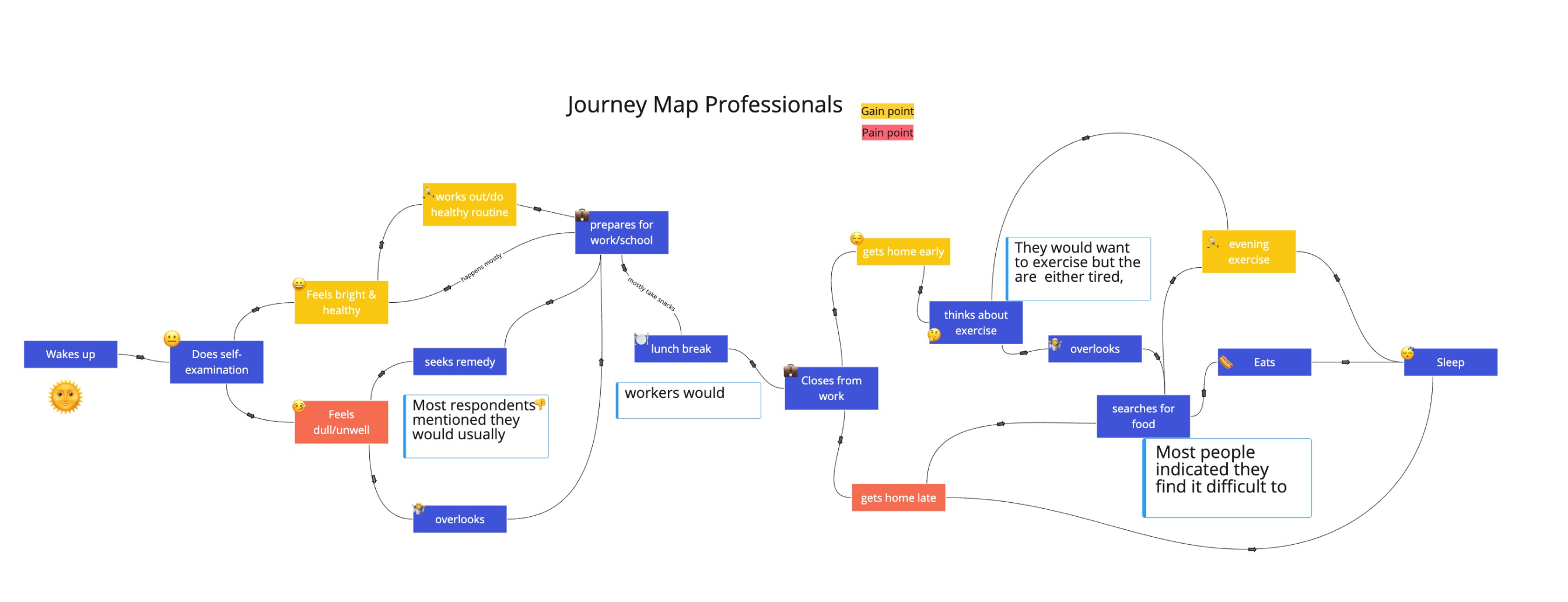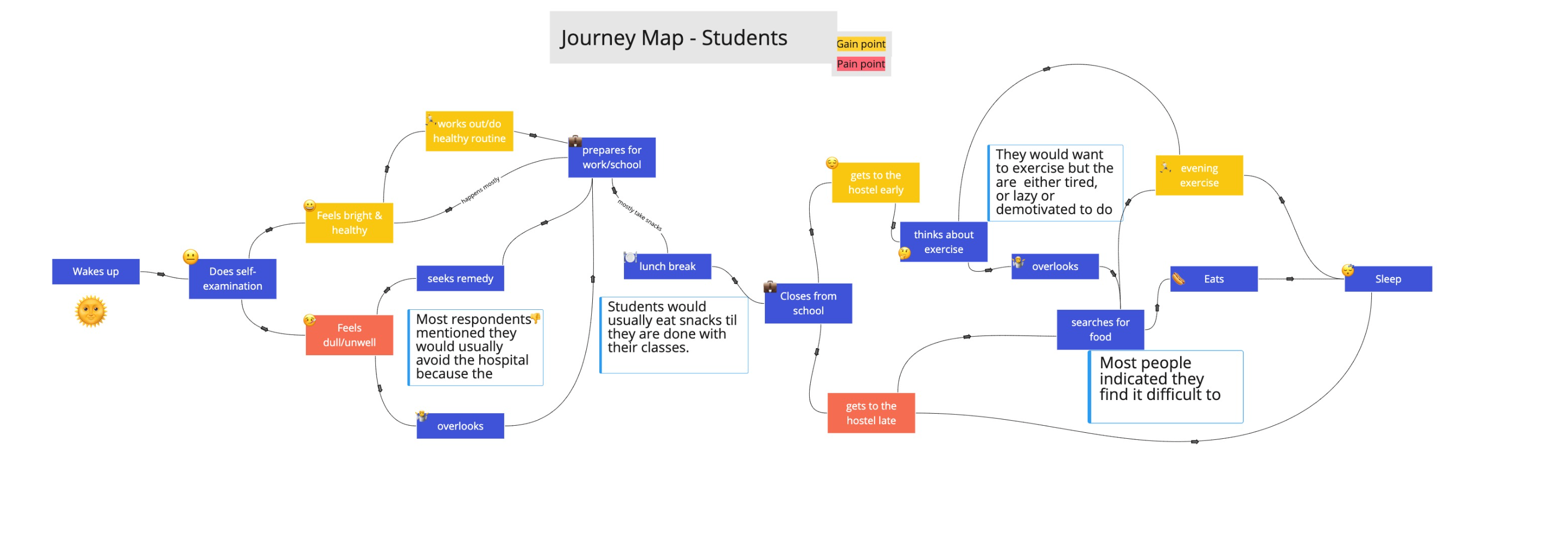Sub Challenge 4
How might we engage busy urban and peri-urban dwellers to keep a healthy lifestyle that avoids NCDs, in the face of cultural comforts that prevent them from doing so?
Target Market
The target market for this challenge were Urban and Peri-Urban dwellers with very active daily routines.
Kojo Baafi
Age:25Location:Accra, Ghana
Status:Single
Job:Entry level Professional/Student tertiary

Bio
Kojo Baafi considers going to the hospital for health checks is a good practice. But it is unusual for him since he wasn’t brought up that way. More importantly, he despises the environments and stressful procedures at most of the hospitals he can afford. He is fairly informed about NCDs and wishes to keep a healthy lifestyle. However, he goes to work very early and gets home around 8pm, very exhausted. He usually buys the food he eats since he doesn’t cook.
Quotes
I exercised every morning but as soon as I started work, I could not keep with the routine as work took most of my free time
Wants & Needs
- He is looking for motivation and convenience ways to sustain healthy lifestyle habits.
Frustrations
- Exercise fatigue
- Higher cost of fruits, herbs, vegetables and gym services
- Difficulty in finding these products and services relative to junk foods
Quotes from Respondents
From interviews about healthy life style constraints from work/school
I exercised every morning but as soon as I started work, I could not keep with the routine as work took most of my free time
My work makes me skip breakfast. Also, I don't return from work early: I get home around 7:30-8 p.m.
At school, I worked a lot. I will come back to my hostel late and at that time, you can only get junk: indomie, kelewele, shawarma. I would sleep shortly after eating
From interviews about social cultural factors
We are guilty of saying that. In our part of the world, we have grown to appreciate that kind of thinking. But I don't make it so much of a value to me for me to gain weight. I am not moved by such comments like "you are chewing grass".
Thinking about family, when people realise that you are eating good, they will come and put their burdens on you. So you will go in for the normal ones. I will just buy sachet water instead of bottled water.
When I started working at Access Bank, I got a big belly. People said because I now work at a bank, I am now living good. But I did not take their comments as compliments. Actually, it was because I was eating late and not exercising. That is the main reason why I left Access.
From interviews about routine health checkups
Going to the hospital for checkup is good, but the time you have to spend, and the processes you must go through is the problem.
I am someone who hates the hospital so I avoid it at all cost. Even my yearly review happens in the office so I don’t go to the hospital
Personally, I try to go the hospital every month. Maybe because I am always tired so I go to check what is wrong
From interviews about the cost of healthy lifestyle habits
I am open to not spending excessively on healthy habits but I can work within my budget and make provisions from what I currently earn. If it is not important, I don’t spend.
I don’t see it as an extra cost. Because when I get sick and go the hospital, I will spend money and time.
Get a solid stream of income to fund your healthy life. I say it isa long term investment.
From interviews about the lack of motivation to exercise
I think I need someone to motivate me and I need to discipline myself. At least, I have to engage in one activity during the day.
Very very very challenging [to start and stick to an exercise routine]. Skipping, no! I just turned to walking.
I legit don’t do anything [to stay fit]. I use my free time to sleep or watch something.
Unmet Need
From the primary research conducted, the following findings were identified.
- Some of the respondents, over 50% find exercise routines as very tiring and stressful due to the fatigue involved
- They also mentioned that exercise fatigue makes them too tired to quickly turn to other activities of the day
- A score of the respondents indicated that it is more difficult to stick to healthy diets because they are unavailable at late hours (around 8pm), the time they usually close from work and settle down for dinner
- About 68% of the respondents would want to go to the hospital for checkup but avoid it due time consuming processes and unpleasant hospital environments
- 74% of the respondents indicated that work or school engagements inhibit commitments to healthy lifestyle (over 60% rated the interference of work/school ≥ 3 on a scale of 1-5)
- Relative to work constraints, social factors has less influence on people’s commitment to healthy lifestyle habits (more than 80% rated the influence of social norms 3 and below on a scale of 1-5)
Market Demand
The market demand for the solution was determined by asking the respondents how they plan to embrace an extra cost which may come with starting and sticking to healthy lifestyle habits.
Over 70% of respondents expressed an openness to accommodating a new cost item in their expenses to cater for healthy lifestyle habits.
They would do this by adding cost to their budget (some of them are already doing this)
Some indicated they would add an additional source of income specifically to address this cost.
Market Constraints
Key Behavioral or Market constraints and challenges identified.
Respondents expressed challenges they face when trying to maintain a healthy lifestyle:
Motivation & Discipline: People expressed low self-motivation and discipline towards physical activities and cutting down on junk foods
Motivation & Discipline: Obese students feel shy to exercise among their peers in school (higher education campuses)
Access & Cost: People noted that healthy foods are less easy to find and relatively more expensive than junk foods. Specifically during late hours of the day and on school campuses
Resources
Research data and other useful materials related to this challenge.

